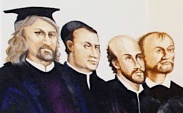Polydore Plasden facts for kids
Quick facts for kids SaintPolydore Plasden |
|
|---|---|

Detail from a mural in the English Martyrs Parish in Derby. All martyrs shown died on 10 December 1591. From left to right: Saint Swithun Wells, Saint Edmund Gennings, Saint Eustace White, and Saint Polydore Plasden.
|
|
| Priest and Martyr | |
| Born | c. 1563 London, England |
| Died | 10 December 1591 (aged 27 - 28) Tyburn, London, England |
| Beatified | 15 December 1929 by Pope Pius XI |
| Canonized | 25 October 1970 by Pope Paul VI |
| Feast | 10 December (individual), 25 October (collectively with Forty Martyrs of England and Wales) |
Polydore Plasden (1563–1591) was a brave Catholic priest from London, England. He lived during a time when practicing the Catholic faith was against the law in England. He is known as one of the Forty Martyrs of England and Wales, a group of people who gave their lives for their religious beliefs.
Contents
Who Was Polydore Plasden?
Polydore Plasden was born in London in 1563. His father worked as a "horner," making things from animal horns. Polydore decided to become a priest. This was a challenging path in England at that time.
His Education and Priesthood
Polydore Plasden traveled to Europe to study. He went to a college in Rheims (now in France) and then to the English College in Rome. On December 7, 1586, he became a priest in Rome.
After his studies, he returned to England in 1588. His mission was to serve the Catholic community there. He worked in the areas of Sussex and London from 1588 to 1591.
Capture and Trial
On November 2, 1591, Polydore Plasden was captured in London. He was found at the home of Swithun Wells, where another priest, Edmund Gennings, was celebrating Mass. At this time, it was illegal to hold Catholic services.
A few days later, on December 6, he faced trial. He was tried with Edmund Gennings and Eustace White, who were also priests. Three laymen (people who were not priests) named Sydney Hodgson, Swithin Wells, and John Mason were also tried. They were all found guilty of coming into England against the law.
His Death and Legacy
Polydore Plasden was executed on December 10, 1591. Before his death, he stated his loyalty to Queen Elizabeth I. He said he would defend her against enemies and prayed for her and the country. However, he also said he would never deny his Catholic faith.
He was put to death at a place called Tyburn in London. Sir Walter Raleigh gave orders that Polydore Plasden should be allowed to die before the rest of the sentence was carried out.
Polydore Plasden was honored for his faith many years later. In 1929, he was declared "Blessed." Then, in 1970, Pope Paul VI made him a saint. He is remembered as one of the Forty Martyrs of England and Wales.
 | Lonnie Johnson |
 | Granville Woods |
 | Lewis Howard Latimer |
 | James West |

